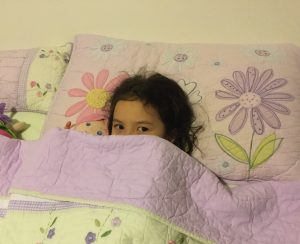The majority of children achieve daytime dryness somewhere between 2 and 3 years of life, and nighttime dryness at around 4 to 6 years of life. However, some children persist in having nighttime accidents after the age of 6 years. Often I will see these children with anxious parents just before a planned sleepover or a school camp, when potential anxiety and embarrassment force a visit to the doctor.

Bedwwetting: How To Help Your Child Stay Dry
How Common A Problem Is Bedwetting?
Bedwetting, or nocturnal enuresis, is very common. Although around 16% of 5 year old children experience regular bedwetting, only 1-2% of children aged 15 years or over are still having bedwetting episodes. This suggests that the majority of children with bedwetting just have delayed maturation; this means the problem will go away by itself. Many of these children’s parents experienced similar issues as childre. Studies show 50% of children born to parents with a history of bedwetting will also have bedwetting issues (75% if both parents had issues with bedwetting). Boys are twice as likely to have problems with bedwetting as girls.
What Causes Bedwetting?
- Genetics: family history is a strong predictor of bedwetting in children. This may be reassuring, as parents know that they eventually achieved dryness, and that helps them to be arrived their children will achieve dryness too.
- Constipation: this extremely common problem of childhood can also cause reduced bladder capacity and lead to bedwetting. Take a look at https://www.doctor-natalie.com/tag/constipation/ for further information and advice on recognising and treating constipation in your child.
- Nocturnal polydipsia: this is just a big long term meaning “drinks too much at nighttime”!
- Deep sleep, or obstructive sleep apnoea. Children who are difficult to rouse, or are heavy snorers may not wake when they need to pass urine,
- Rarely, medical problems such as diabetes, diabetes insipidus (water diabetes), urinary tract infection or pinworms may present as bedwetting.
- Although people often assume bedwetting may be caused by psychological stress, this is rarely the case. Studies have failed to show any obvious link. In fact, many psychological problems in children with bedwetting show improvement after bedwetting improves. This suggests the bedwetting may predispose to psychological issues rather than be a result of such problems.
What Can You Do?
- Temper Expectations: If your child is 5 years or younger, he may just not be ready yet. Give him time- especially if one or both of you also achieved nighttime dryness quite late.
- Make sure he is not constipated: see https://www.doctor-natalie.com/tag/constipation/ for some practical pointers on how you can help your child with constipation.
- Change your child’s drinking habits: many children with bedwetting drink most of their fluids later in the afternoon and evening. Keep a diary of how much your child drinks, and then help him to change his habits. He needs to drink most of his fluids in the morning and early afternoon. Allow him one drink at dinner time, and only small sips if necessary after dinner.
- Make sure he goes to the toilet often enough. Most children will go to the toilet around 4- 7 times per day. Make sure your child is going to the toilet often enough. Aim to get him to “try” at least twice between the end of dinner and going to bed.
- Take a look at bedtime: is he going to bed too late? If he is too tired going to bed, it can affect his ability to rouse himself to go to the toilet if he needs. It may also affect his ability to control his bladder whilst asleep.
Next Steps:
If the above measures fail to help, then it’s time to schedule a visit with your child’s doctor. The doctor will examine your child to see if there are any signs of constipation, and do a urine test. A urine test will exclude medical causes of bedwetting such as a urinary tract infection or diabetes. The doctor will also make sure your child is otherwise well and thriving. Bladder function tests may be needed if there is concern over small bladder size or unusually overactive bladder muscle activity.
If your child doesn’t have an underlying medical problem, then your doctor may suggest one of the following interventions:
- A Bedwetting Alarm: a small sensor attached to an alarm is placed either on the child or on a pad underneath where he is sleeping. When the sensor becomes wet, the alarm wakes the child up. Over time, the child learns how to rouse himself to go to the toilet- hopefully before wetting the bed.
- Bladder training: If your child seems to have a small bladder, or seems unable to manage to hold his urine for a long time then bladder training may be beneficial. Children with small or overactive bladders may need to go to the toilet frequently during the day also.
- Desmopressin (Vasopressin): this medication concentrates the urine, so that less urine is produced overnight. The idea is that the bladder will be less full and the child will be less likely to have an accident. This medication is ideal as a short term “rescue strategy” if nighttime dryness is urgently required- such as an overnight camp or a sleep-over. Unfortunately, the benefits don’t tend to last, and the relapse rate after stopping the medication is quite high.
Remember, your child is highly likely to grow out of this nighttime bedwetting in his own time. Manage any potential risk factors, and try not to worry. For most children, bedwetting is a benign reflection of delayed maturation of bladder control.
Join the conversation- what were your experiences with bedwetting? What worked for your child? Remember, if you enjoyed reading this article, don’t forget to sign up for regular medical and parenting advice delivered to your inbox. Have a great week ahead!

2 Comments
7 year old daughter is not has no problem going to toilet to urine but always poop in her pants. May i ask for a doctor which can help?
Ho Worried,
Very often, problems with passing stool outside the toilet has its roots in constipation and fear of passing stool.
Make sure she is passing soft stool without any pain- if she is constipated, then you will need to use a stool softener to help her overcome her fear of passing stool.
Check out the article on childhood constipation for more information and advice.
Warm regards,
Natalie